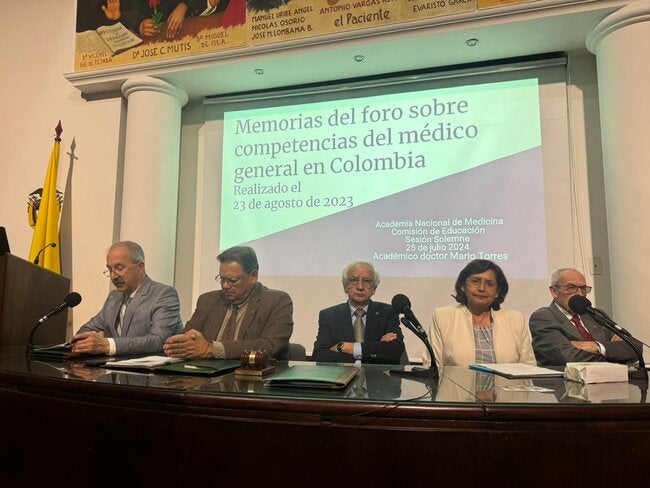Raul Casado
Madrid, February 29 (EFE).- It is the “sanctuary of the mind”, where the personality and identity of people lie, but the brain is also the “black corner of medicine”, the only organ whose functions have not yet been improved. It has been deciphered, although recent developments are putting neuroscience on the verge of a “revolution.”
These are the arguments of the Spanish neurobiologist Rafael Yuste, professor and director of the Center for Neurotechnology at Columbia University (USA) and one of the main promoters of the “Brain” project, promoted by the Barack Obama administration and continuing until now. Even Donald Trump and Joe Biden's laboratories include 550 laboratories around the world with a budget of about $6 billion.
He interrupts his twenty years of teaching and research activity in the United States to present in Madrid the report he prepared – at the request of the House of Representatives – with twenty other experts in neuroscience, neurotechnology and bioethics. About progress in neuroscience and its ethical implications, he analyzes this progress and challenges in an interview with EFE.
Rafael Yost describes how neurotechnology already helps treat Alzheimer's disease, Parkinson's disease or stroke, but also how it can change personality, be used to extract secret data, to improve a person's cognitive abilities, how to be able to decode imagined images or words or interfere with one's will. Free.
In front of his other colleagues, he unabashedly defends the importance of using all tools, including artificial intelligence, or the emergence of private companies whenever possible, to combat diseases associated with brain diseases. “Technology is always neutral; the problem is when the use of neurotechnologies overtakes medicine and is used on the general population for commercial purposes.”
Or we praise the achievement achieved by the company “Neuralink” – owned by billionaire Elon Musk – by implanting a chip in the human brain that is able to “read” neural activity and help restore brain functions that were damaged as a result of a heart attack or amyotrophic lateral sclerosis, although there is a slight difference. , noting that it is not entirely new and that brain-computer interfaces have been implemented for twenty years in several countries, including Spain.
The neurobiologist emphasizes that both new diagnostic tests, which will allow early detection of these diseases, and new treatments that act on the causes and not the symptoms – some of which have already been approved in the United States and could be implemented in the coming months. accepted by the European Union – constitutes “the beginning of what will be a revolution”.
Because the increase in life expectancy will lead to one in three people developing a degenerative disease associated with aging, and neurotechnology – he asserts – will provide researchers, doctors and psychiatrists “the key” to unlocking the mysteries of the brain and “entering” this device to help patients.
Challenges? “a lot”. The researcher said that this technology would make it possible to intervene in a person's brain to fight the disease and slow its course, “but also to act for purposes that are not entirely useful,” and stressed at that point the importance of having “clear” rules of the game that are always compatible with humanitarian values and human rights.
Rafael Yuste points out the importance of preparing draft laws that protect “neural rights” and “brain data”, which are legislative initiatives that have already been implemented in several countries (Chile, Brazil, Uruguay, Mexico or in the US state of Colorado) to protect brain activity and all personal information that can be extracted from it.
It distinguishes the use of technologies that are only accessible to neurosurgeons, “ideally regulated as medical devices,” from others that go beyond the medical field, and that are marketed through large digital and e-commerce platforms for recreational uses (glasses, headbands, bands, or headphones). head or bracelets) that lack any kind of organization but can also be used to access neural data that can then be commercialized.
During the interview, the Madrid neuroscientist emphasizes that the challenges of medical research are still many (cancer, cardiovascular diseases, etc.) but he also emphasizes that the brain “is the black corner of medicine”, because it is the only organ whose functions have not yet been analysed. It was understood.
“The lack of understanding of organ physiology means that doctors, psychiatrists and neurologists struggle heroically, with their hands tied, as they try to fix a machine they don't know how to work.”
He concludes that shedding light on this “black corner” is the current major medical challenge to unravel all the mysteries that still exist about the brain and its functions and, above all, “to be able to help the millions of patients who look us in the face.” Every day. Ask for help.

“Social media evangelist. Student. Reader. Troublemaker. Typical introvert.”

:quality(85)/cloudfront-us-east-1.images.arcpublishing.com/infobae/TR43PX4FQRCGJOYTK6DVVHHXGE.jpg)



:quality(85)/cloudfront-us-east-1.images.arcpublishing.com/infobae/5BAZRN7C3BFXFHI4X2LGGH7TKU.jpg)
More Stories
National Academy of Medicine and PAHO present reports of the Colombia General Physician Competency Forum – PAHO/WHO
Academic excellence in medical sciences is recognized at Granma.
Medical simulation has revolutionized the training of doctors in the country.